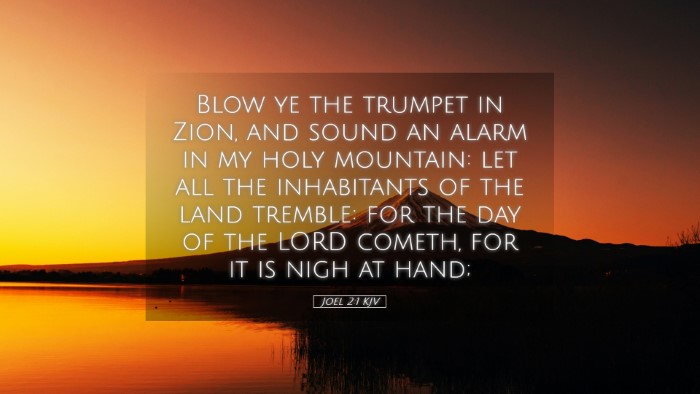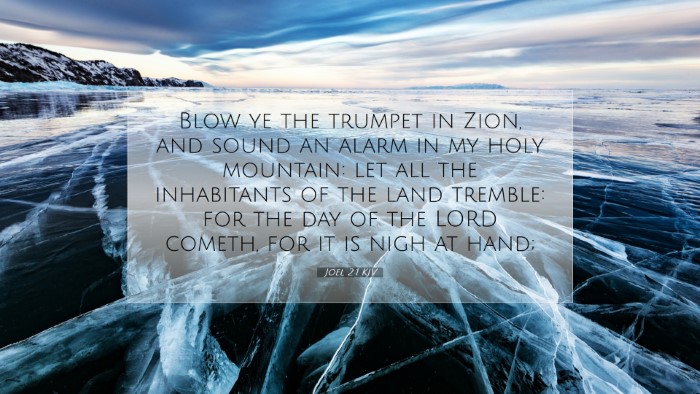Bible Commentary on Joel 2:1
Context and Introduction:
The Book of Joel is a prophetic text that emphasizes the sovereignty of God and the dire consequences of sin. Chapter 2 begins with a call to attention, intended for the inhabitants of Judah, urging them to recognize an imminent judgment associated with the Day of the Lord. In Joel 2:1, the phrase "Blow ye the trumpet in Zion" serves as a divine alarm to the people, emphasizing both urgency and the necessity of repentance.
Verse Analysis:
Joel 2:1: "Blow ye the trumpet in Zion, and sound an alarm in my holy mountain: let all the inhabitants of the land tremble: for the day of the Lord cometh, for it is nigh at hand."
Call to Action:
Sounding the Alarm: The trumpet, as indicated by Matthew Henry, symbolizes a call to awareness. In ancient Israel, the shofar (ram's horn) was often used to herald significant events. Here, Joel employs this imagery to evoke a sense of urgency among the people to heed God's warning.
Significance of Zion: Albert Barnes notes that Zion represents both the physical location of Jerusalem and the people of Israel symbolically gathered in spiritual communion with God. The reference to "my holy mountain" underscores God's chosen relationship with His people and His dwelling in their midst.
The Day of the Lord:
The "day of the Lord" signifies a period of divine intervention and judgment. Adam Clarke elucidates that this day combines elements of both the imminent disaster—likely referring to the locust plague—as well as eschatological themes pointing to ultimate judgment. This duality should compel both immediate and contemplative responses from the listeners.
Theological Implications:
God's Authority: The command to "blow the trumpet" reflects God's sovereign authority over His creation. It serves as a reminder to theologians and students of Scripture that God's initiatives often come with clear calls to repentance and a return to righteousness.
Judgment and Mercy: The balance of God's judgment and His invitation to repentance must be acknowledged in this verse. As noted in various public commentaries, God’s proclamations of impending judgment are intertwined with His yearning for the people to come back to Him.
Application for Today:
The Call to Repentance: Pastors and church leaders today can draw from this text the importance of sounding the alarm on sin within communities. Just as Joel admonished the people of Judah, contemporary leaders are tasked with calling their congregations to awaken from spiritual lethargy.
Awareness of Divine Timing: Understanding that the "day of the Lord" can manifest in various forms, from personal to communal experiences, emphasizes the necessity for believers to remain alert and responsive to God's movements in their lives.
Conclusion:
In summation, Joel 2:1 serves as a profound reminder of the urgency with which the people of God are to respond to His voice. The trumpet's sound and the call for trembling denote seriousness in recognizing the holiness of God and His righteous judgment. For pastors, students, theologians, and Bible scholars, this verse compels an examination of both personal and communal duty to respond to God's alerts, fostering an environment prepared for both judgment and grace.


